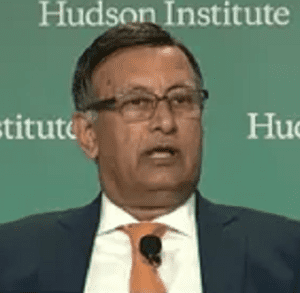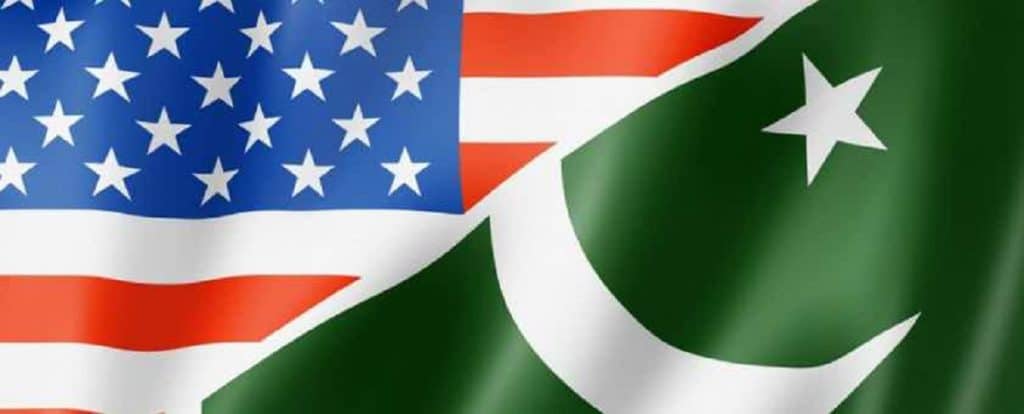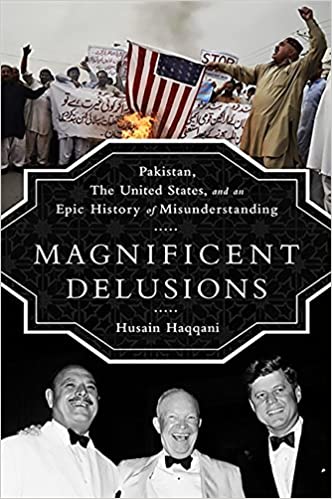World Geostrategic Insights interview with Amb. Husain Haqqani on the possibility of beginning a new phase in Pakistan-U.S. relations, Pakistan’s place in the long-term strategic interest of the United States, and whether a renewed U.S.-Pakistani partnership could help improve India-Pakistan relations.

Husain Haqqani is a Former Ambassador of Pakistan to the United States and the Director of South & Central Asia, Hudson Institute, Washington DC. He is the author of “Pakistan Between Mosque & Military”, “Magnificent Delusions: Pakistan, the United States and an Epic History of Misunderstanding”, and other two books.
– Pakistan-U.S. relations have always been characterized by phases of rapprochement and distance, often coinciding with changing U.S. interests in the South Asian chessboard. Relations were particularly turbulent under Imran Khan. Meanwhile, relations began to change soon after Shehbaz took office as prime minister. Islamabad signaled that it wanted friendly relations with the United States, based on realistic assessments rather than rhetoric. At the same time, the United States has expressed a desire to regain lost momentum by renewing ties through Pakistan’s new government and it has agreed to help cash-strapped Pakistan negotiate a deal with the IMF to revive the country’s economic rescue program with the global lender. Islamabad and Washington are celebrating the 75th anniversary of diplomatic relations this year. Do you think it is realistic to reset and begin a new phase? Are significant positive developments in terms of bilateral relations possible, considering also that the two countries have often had difficulty in securing a stable and mutually beneficial relationship?
The idea of a reset in U.S.-Pakistan relations is not new, but engagement would have to be without illusions on both sides. There is a need for a bilateral relationship that is based on greater humility and an awareness for each side of what it can and cannot get from the other. Notwithstanding phone conversations, in-person meetings, and social media exchanges between Pakistan’s Foreign Minister Bilawal Bhutto Zardari and U.S. Secretary of State Antony Blinken, there is currently a benign disinterest towards Pakistan within U.S. policy circles. American officials feel that past engagement at intensive levels did not yield what the U.S. sought and Pakistanis, too, were left disappointed. While diplomats from both countries are trying to reverse this, American withdrawal from Afghanistan has led many U.S. policymakers to take a break from dealing with Pakistan, and the complicated U.S.-Pakistan relationship, as well. There is some bitterness in Washington about how Pakistan may have foiled its plans for Afghanistan, leading to U.S. withdrawal and the return of the Taliban to power. There is also frustration with Pakistan’s policies towards Jihadi terrorist groups.
Pakistan’s economic needs dictate that Pakistan have good relations with the U.S. But currently the magnitude of trade and investment does not make Pakistan a critical economic partner for the U.S. If the future Pakistan-relationship is to be determined by economic factors rather than strategic overlap, Pakistan would have to up its game in being able to trade with the U.S. at levels much higher than what it has managed for almost 75 years. Pakistan’s bilateral trade with the U.S. stands at $6.6 billion, which is comparable to U.S. trade with Morocco. That should be seen in the context of Morocco’s population, which is just 36 million, compared to Pakistan’s population of 210 million.
Historically, Pakistan received significant U.S. aid in return for military or intelligence favors that were important for American strategic concerns. At one time, Pakistan was the second largest U.S. aid recipient after Israel. But now Pakistan’s strategic priorities differ from the United States. For Pakistan, India was and remains an existential threat and Pakistan’s security doctrine is framed along those lines. For the United States, India is a critical partner whose economic and military rise, American champions. With American withdrawal from Afghanistan, Pakistan’s geo-strategic location is of limited importance to the American security establishment. While America has some interest in Afghanistan’s future – primarily humanitarian and terrorism related –Pakistan’s role as a U.S. partner is limited by its inability to convince the Taliban to comply with demands of the international community.
– The long-term strategic interest of the United States in containing China aligns with India, its strategic partner, thus the growing alignment between China and Pakistan could cast a shadow over future U.S. engagement with Islamabad. The China-Pakistan Economic Corridor is the BRI’s largest project, and partly because of U.S. embargoes, Pakistan is now almost entirely dependent on China for military supplies, and certainly the change of government in Islamabad will not derail China-Pakistan cooperation. Therefore, the geopolitics of the region may have an impact both on U.S. and Pakistan foreign policy choices and future engagements. Do you think Pakistan could in any way take an important place in U.S. strategic priorities?
U.S.-China peer competition, and American withdrawal from Afghanistan, have resulted in a situation where American strategic interests are no longer as closely aligned with Pakistan, as they were during the Cold War and after 9/11. The last two American administrations have viewed China as the pre-eminent threat facing the world, and have oriented their foreign, security, and economic policies accordingly. The Indo Pacific strategy is centered around preventing China’s rise and in ensuring alignment with American partners and allies around the globe. China, however, has long been viewed by most Pakistani regimes as their closest strategic partner primarily because of a shared antipathy towards India. Pakistani public opinion is also more favorable towards China than the United States and has been for many years.
There are areas of strategic interest for the U.S. where Pakistan could play an important role. One of these is the issue of terrorism. Just recently Pakistan took several steps towards fulfilling international demands for holding accountable Pakistanis who had engaged in terrorism in other countries, including India. Pakistani authorities detained Sajid Mir, the mastermind of the 2008 Mumbai terror attacks, after years of denying that he was in Pakistan. But skeptics say that Pakistan’s steps in this area would have to be sustained over several years before being fully believable.
– Pakistani Foreign Minister Bilawal Bhutto-Zardari has argued for greater engagement with India, saying that Islamabad has been isolated globally because of its past policies. What might the policy change in Pakistan mean for relations with India? Will India-Pakistan relations experience an upswing under the new government of Shehbaz Sharif? How might renewed U.S.-Pakistani relations help in this regard?
India and Pakistan know that good relations would benefit them both but there are reasons why that knowledge has not translated into a workable strategy for positive engagement. It has not happened for seven decades and might not happen quickly any time soon. The reasons that have blocked good relations are entrenched and will not disappear simply because of a change in government in either country. Both the Sharifs and Bhuttos have spoken of the need for renewed engagement with India. They are undoubtedly sincere in that desire. But the overall political environment in Pakistan is still hostile towards normal ties with Pakistan’s largest South Asian neighbor. The new Pakistani government might resume trade ties on a limited scale. Something bigger is difficult because Pakistanis have been made to view India as a permanent enemy. Soon after Foreign Minister Bilawal Bhutto-Zardari made those remarks, Pakistan’s Foreign Minister issued a clarification that there was no change in policy towards India.
For India-Pakistan relations to move out of the current cycle, it would require the Pakistani military to clamp down on the Pakistan-based jihadi groups that focus on India and ensure no further attacks take place. India would need to move beyond simply seeking to isolate Pakistan, and agree to discuss all issues between both countries, including Kashmir. Pakistan has always sought international mediation in its ties with India, especially the Kashmir conflict. However, India has consistently been against any external mediation. Since the 1990s every American administration has stated that it will only mediate if both sides ask it to do so, which is unlikely to happen. In early decades, the U.S. tried to be neutral in India-Pakistan conflicts or skirmishes but in recent year, the U.S. has asked Pakistan to ‘do more’ and to crack down on terrorism and improve relations with India. That has not really changed the ground reality and has only drawn Pakistan closer to China.
Husain Haqqani – Former Ambassador of Pakistan to the United States and the Director of South & Central Asia, Hudson Institute, Washington DC. Amb. Haqqani is the author of four books: Pakistan Between Mosque and Military (Carnegie, 2005), Magnificent Delusions: Pakistan, the United States and an Epic History of Misunderstanding (Public Affairs, 2013), India vs Pakistan: Why Can’t We Just Be Friends? (Juggernaut, 2016) and Reimagining Pakistan: Transforming a Dysfunctional Nuclear State (Harper Collins, 2018).








